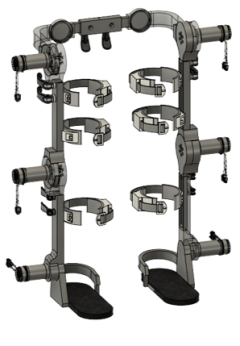Motivations: Those who are unable to walk independently typically undergo physiotherapy to restore and improve movement as well as strengthen and maintain muscle mass. The EAWa project provides the opportunity for those requiring physical therapy to practice the motions of walking without excessive energy exertion. Alongside being as assistive device for patients, the EAWa product can also be used to help nurses and physiotherapists by reducing the amount of strain they undergo while manually moving patients during rehabilitation exercises. The innovation of such devices provides a solution to those who are becoming over-worked in the field of healthcare.
Impact: Our project provides opportunities for innovation and creativity. Participating students now and in the future get to apply all the knowledge that they have learned throughout their undergraduate degree in a way that will have a lasting impact. The goal is to increase accessibility to those living with walking disabilities and to help healthcare workers support their patients more easily and efficiently.

